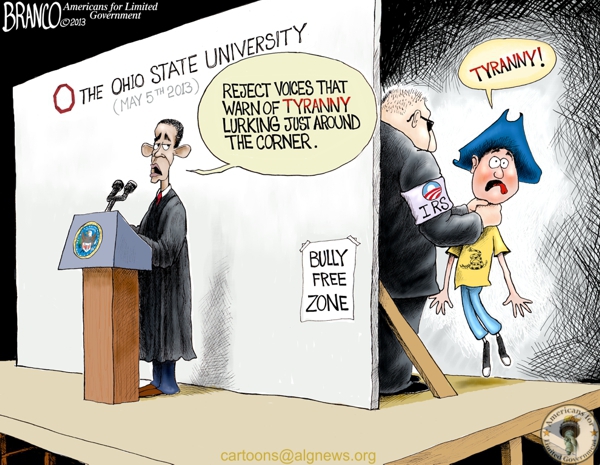
Debunking the IRS excuses and evasions
By Daniel Foster
Much of the liberal intelligentsia
(including those in the Obama administration) have, to their credit,
condemned the IRS targeting of conservative groups — or at the very
least, have not sought to defend it. Perhaps that’s because all of the
early attempts at justifying, excusing, minimizing, insulating, and
explaining away the practice came up so short.
It was just Cincinnati.
This
was one of the earliest attempts to minimize the bigness of this deal,
one cooked into the IRS’s own statements and apologies. It is also one
of the lamest.
It’s true that much of the targeting took place at
the IRS’s Cincinnati offices, but that’s because that’s where the IRS’s
Tax Exempt and Government Entities Division is headquartered.
If I punched you in the face, you wouldn’t take much comfort in my blaming only my hand. Besides, there were other offices involved — according to the Washington Post, at least two in California and one in D.C.
It was just “rogue,” “front line” people.
Similarly,
the IRS’s 501(c) honcho, Lois Lerner, along with administration
officials and their defenders in the media, emphasized that these were
“front line” employees, not senior managers or political appointees.
Just Wednesday, acting IRS commissioner Steven Miller claimed he had
identified two “rogue” employees responsible for the bulk of the
targeting. But the coordination between offices, and the involvement of
Washington, cast doubt on the idea that this was a two-man job. Lerner
became aware of the targeting, at the very latest, in 2011, and the IRS commissioner and his deputy learned
about it in May of 2012. But none saw fit to go public with that
knowledge, even though there were during this time well-documented
complaints of excess scrutiny that were emanating from tea-party groups.
Miller may have even lied about the targeting operation in response to
congressional inquiries.
There was no political motivation.
Lerner
has also claimed that there was no political bias involved in the
decision to put conservative groups through the ringer. She would not
elaborate on how she knows this except to say, “That is not how we do
things.” This might be easier to swallow if hers hadn’t been the same
division that last year illegally leaked tax information about Karl
Rove’s Crossroads GPS to George Soros’s ProPublica.
The IRS was “going where the action was.”
Both Ezra Klein and Kevin Drum
have made the argument that, though it went about it sloppily, the IRS
was trying to solve a legitimate problem: how to flag improper
applications amid an explosion of applicants. They chose conservative
linguistic markers, according to Klein, because there had been an
increase in tea-party-themed applicants, and “like Willie Sutton robbing
banks, [IRS auditors] were going where the action was.” The problem
with that is it sounds a lot like the kind of profiling folks like Klein
and Drum typically abhor in criminal investigations. And in a way, it’s
worse,
since the IRS has not presented any evidence, or any ex ante reason
besides pure political bias, to think conservative groups were more
likely to file unqualified applications than any other kind of group. As
Megan McArdle rightly argues, the way to figure out where to focus your energy when you see a massive surge in applications is to take a random sample. The whole issue here is that the IRS took a decidedly non-random one.
No comments:
Post a Comment